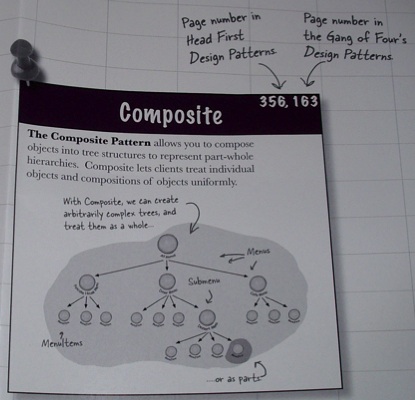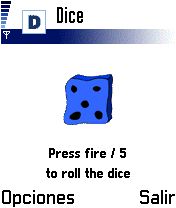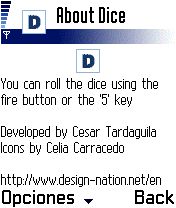Flash Lite or J2ME?
Almost a year ago, I posted a comparison between Flash Lite and J2ME.
As you probably now, the Flash Lite 2 update for Flash Professional 8 has just been released through Macromedia Labs, and it’s time to rewrite that post.
Almost a year ago, I posted a comparison between Flash Lite and J2ME.
As you probably now, the Flash Lite 2 update for Flash Professional 8 has just been released through Macromedia Labs, and it’s time to rewrite that post.
I'm sure you have read in the aggregators, but I won't do any harm to read about it once again.
FlashLite 2 player is available through the la Adobe online store, and it costs 8 € (ex. VAT).
There is no official documentation yet, and it is not possible to start developing specific content, but at least we can start testing our old FlashLite 1.1 apps against the new player ;)
You can read more about the announcement at Flash Devices.
Enjoy your new toy...
I am sure you have heard about the Head First series and about the Head First Design Patterns book, because it is probably the best introductory book to understand design patterns.
Last week I was browsing amazon when I found this item: Head First Design Patterns Poster.

As its name says, it is a poster (a big one, in fact) that contains a graph (taken from the original book), not an UML diagram but a graph that explains the pattern and also the page number of the pattern in both the Gang of four and Head First Design Patterns.
It visually summarizes 18 patterns, and it is attached to the wall in front of my computer right now...
(By the way, all the links in this post will NOT earn me a comission).
Yesterday was a busy day at NetBeans. Not only they have released NetBeans 5.0 beta, but also Mobility Pack 5.0 beta
At first glance, there are some new features that will make our life a bit easier: JSR 172 ( webservices ) support, improved UI designer, and improved support for emulators.
More information and downloads here: Java ME MIDP Development for NetBeans IDE 5.0
Sony-Ericsson's Developer World has published the third article in a series about 3D programming. This is new article is about programming particle systems
Here are the links to the three articles:
Sun Developer Network has published the second article in a series about ecryption in MIDP
Motocoder, Motorola's developer center, has released an article about the JSR 135, better known as the Mobile Media API.
The article includes a working example of an application that allows to capture images by camera.
Sony Ericsson's Developer World has published the second article in a series about "3D programming for mobile devices using M3G".
The tutorial is written by Mikael Baros, and contains an easy to understand introduction to working with lights when programming in 3D. Althought the code it contains is written in J2ME, the concepts can be easily ported to other languages.
Nokia announces that the next generation of the Series 60 devices will support the Connected Device Configuration.
Nokia has published the Final Release of the JSR-226 Scalable 2D Vector Graphics API for J2ME specification, developed under the Java Community Process. The goal of this specification is to define an optional API package for rendering Scalable 2D vector images, including external images in SVG format.
From the specification docs:
The primary use cases of this API include:
•Map Visualization
•Scalable Icons
•Animations (messaging)
•Technical Illustrations
You cand download the docs here
Once again, it seems that Flashlite and J2ME run in parallel. Any thoughts?
There's an interesting article by Dan Moore at theserverside.com about J2ME that is, in my opinion, a must read, not only if you are interested in mobile java.
There is an interesting discusion about the pros and cons of cell phones that can be applied also to Flashlite, and then the author provides some useful information about the J2ME platform, the available development tools, security issues, ...
Here's the link: working with J2ME
It's time to develop a MIDlet. I've started with a simple one, just a dice ( a small cube marked on each side with from one to six dots ), without any animation, but that just shows the basic architecture of a MIDlet, and a bit of low-level key management.
Two screenshots:


Have you ever worked as part of a team where all the other developers are Java experts? How many times have you heard "Flash is very strange, there are a lot of quirks"?.
Well, Java also has its own quirks, like, for instance the Random class. Maybe this is obvious for all the experienced J2ME developers out there, but it took me almost an hour of my work to notice that the Random class ( java.util.Random ) that is part of the MIDP 1.0 is different from the "standard" J2EE Random class.
And the difference ( and my problem ) came because although there is a nextInt( ) method, there's not a nextInt( int i ) method in the J2ME class.
So, what if I need to generate a random number smaller than a given value?.
Easy:
Random random = new Random( );
int randomNumber = Math.abs( random.nextInt() % UPPER_LIMIT );
where UPPER_LIMIT is a constant, whose value is the upper limit of the random value.
It's time to add a new category to this blog: J2ME. Don't expect to find anything specially brilliant here ( well, you know, if you've read the other categories you actually know that you can't expect anything brilliant here ).
Anyway, as I'm actually focusing a bit more on J2ME, and devices in general, I'll try to post about the things that I might find of interest.
I'll start with a collection of links ( many of them for my own future reference ).
Devices manufacturers:
Nokia forum
Siemens developer portal
Sony Ericsson developer world
Java resources:
Mobility resources at java.sun.com
J2ME package listing
J2ME Java Forums
Microdevnet
J2ME.org forums
JGuru J2ME faq
Jason Lam
Midlet.org
MIDP Programming with J2ME
Benhui.net
J2ME Resources
More to come!
UPDATE:
J2ME Open Source Software Directory
UPDATED 21/12/2004
MIDP 2.0 games